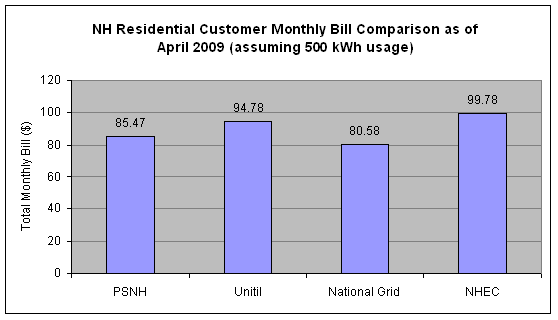A Typical Bill
A typical electric bill for most customers in New Hampshire consists of a Customer Charge, Delivery Charge, Stranded Cost Recovery Charge, System Benefits Charge, Electricity Consumption Tax and an Energy Charge.
The Customer Charge is a fixed charge
and is constant regardless of the amount of electricity
used. This charge recovers costs associated with providing
service to customers, such as installing and maintaining
meters, utility poles, power lines and equipment, and
meter reading.
The Delivery Charge is a variable charge
that is based on the amount of electricity consumed
and is in terms of cents per kiloWatt-hour.
Some utilities may charge one rate for the first 250
kiloWatt-hours consumed and a second rate for the next
250 kiloWatt-hours consumed. Also, some utilities may
charge a different rate based on the time of consumption,
i.e. peak or off-peak periods. This charge recovers
costs associated with the delivery of electric service
to customers, such as maintenance and operation of transmission
and distribution
systems, and power restoration and service operations.
The Stranded
Cost Recovery Charge is a variable charge
that is based on kiloWatt-hours consumed in a month.
This charge funds the recovery of a utility’s
past costs, liabilities, and investments that will not
be recovered as a result of the restructuring of the
electricity industry in New Hampshire.
The System
Benefits Charge is a variable charge that is
based on kiloWatt-hours consumed in a month. This charge
funds Core
Energy Efficiency Programs and Energy
Assistance Programs.
The Electricity Consumption Tax is
a variable charge that is a state tax on electricity
consumption.
The Energy Charge is a variable charge that recovers the cost of power supplied to you (See also transmission and distribution systems).

The graph above shows the monthly bill of a typical residential customer in each of the four franchise areas in New Hampshire, assuming that this typical customer consumes 500 kiloWatt-hours in a month.